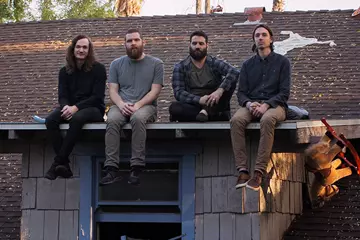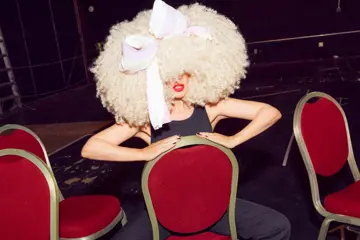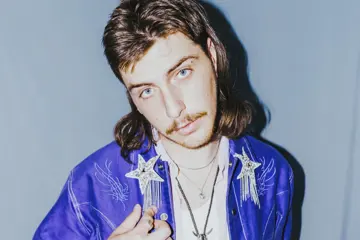 Closure In Moscow
Closure In MoscowClosure In Moscow are making up for lost time. After a significant period between studio albums, the band returns with impressive sophomore offering, ‘Pink Lemonade’. Filled with individual charm and a unique style, the local quintet present listeners with one of 2014’s mid-year gems. We spoke with frontman Christopher de Cinque to get insights into it all.
Hi Chris, how are you?
I'm pretty good, thanks.
I imagine things are going to get real busy, real quick for you guys.
It’s good to finally have good reasons to be really busy and on the horse again.
I remember seeing you guys a few years back with Dead Letter Circus and you had the elaborate one-piece attire. Can we expect anything like that on these current shows?
You can expect all kinds of fun things – attire or otherwise (laughs).
I’ve been listening to ‘Pink Lemonade’ quite a bit since the label sent it over. From my impressions, it is an all-inclusive album. It’s got the rock covered, but there’s an almost Billy-Cobham funk groove that is prevalent on this one...
…We’re a little bit older now and a little bit more sensual (laughs).
Well speaking of being older, I look at stuff I listened to five or six years ago and it’s drastically different to what I listen to now. Is that what prevails when it comes time to write the music?
Definitely. I think, in contrast to the last album [‘First Temple’] it just seemed so drastic because there haven’t been incremental albums to show the smaller progressions. If we had a couple of albums in-between the last one and now it would seem like the logical step. However, when you go dark for this long and then go on your own journey behind closed doors then come out with something after a few years too many; then it seems like we’ve done a total 180, when [in fact] it has been us growing and exploring, and just having a bit of fun with where we’ve taken things.
When you’re talking there about the period of time between albums, five years can seem like 50 years in a manner of speaking. How much has the landscape of promoting an album changed?
We haven’t done anything too out there. We’ve basically just let as many people know as vehemently as possible without cramming it down peoples throats and pissing people off (laughs). Five years is almost like 50 “oldie” years (laughs). There’s such a shitstorm of optional entertainment and so many people vying for your attention with a myriad of things whether it be music, film or art. A lot of wacky marketing concepts come about to try and compete for peoples attention. But, I think with this album, we wanted the album to be the wacky marketing strategy. We wanted to create a mutant beast that was kind of a monolith to behold – to vomit in disgust at or to marvel at or to be confused by or to be enraptured by. However you want to take it or leave it.
The key word you used there “attention”. How much of a consideration was it? You’ve been sitting on these songs for a while. Listeners can be loyal but they can also be fickle in the sense these days you release an album and three months later they’re hitting you up on Facebook asking when the new release is coming out.
Yeah, the key word there – “fickle”. Fickle people and their attention spans are becoming shorter and shorter. It’s a troubling thing because we’re still big fans of the old-school album experience. Albums like ‘Dark Side of the Moon’ to more recently ‘The Love Below’ by Andre 3000, these albums digest as a full experience and are greater than the sum of their parts. It’s a scary thing trying to create something like that with western culture’s fast moving mentality. We think there are still people out there that enjoy that [the album experience] and there’s still something special about that kind of experience that needs to be brought back and nurtured.
In terms of the reception to ‘Pink Lemonade’, I’ve been reading a lot of the reviews put up on your Facebook and the justified response has been positive. Being the Internet though there’s always going to be inevitable criticism. How much of a thick skin do you get to it all?
I don’t know if you can boil people down to these simple terms but there are “critics” and there are “creators”. Some people that create can be critics, but for the most time, the people that are armchair critics like that or “keyboard warriors”, why even buy into it or get hung up on it? Everyone is going to have an expert opinion and this album, people will definitely hate. I don’t think it’s for everyone. But, I think for the people that will love it and vibe on it, I think it will be a special album for those people. It’s totally fine for people not to like us. I don’t expect to be universally liked and I don’t want to be universally liked because I know that’s unrealistic.
I just want to create what we create that is from a real place. We’re selfishly doing it for ourselves and in the selfishness; we’re providing something that is real and passionate that people are more likely to be engaged by because they’ll pick up on it. I think most people, for the most part, can smell conceit from a mile away. If you’re trying to second guess what people want and cater to people who are bitching and moaning, you’re going to create something that isn’t true and is going to come off that way. In a strange, catch twenty-two way, you need to create selfishly and push the envelope for your own creative gratification, so you can connect with people in a more real way.
When I was doing research for this interview, I was looking back at the KYS news archive from about back in 2008 when you guys were just starting to hide your stride. You had some great supports along the way – Coheed and My Chemical Romance. What have been some of the experiences from the early days that have shaped now?
Those international supports were definitely eye openers. We’re quite insulated here in Australia as far as the contrast to touring that goes on here as opposed to America. Being lucky enough to get those supports was a good early learning process when it came to how those international tours operate and I think that was really important in showing us that side of it because it’s a whole different game. It’s so small here because of the population and the cities are so far away. It’s really hard, even at a higher level, to get the chops and see what it’s all about. In America you hit a new city everyday for two months straight and it’s just like this travelling behemoth of an enterprise as opposed to here. Getting to see that at an early stage was really important.
When you say there that it’s a different game in the States, I know you relocated over there for a bit early on. In Australia today we’re fortunate to get much more tours, but like you said, with the distance between cities, do you think Australia is still at a disadvantage?
Totally. For example, the west coast is almost impossible [to play] due to costs or lack of cost feasibility to get over [there]. It sucks because we announced this [album] tour and Perth starts screaming and think you’re doing it just to piss them off or it’s like, “Fuck Perth! We don’t want to go there.” (laughs). But, it’s just the fact of the matter is we’re running a business and it just totally fucks us in the ass. Any money we’d be making on a tour just gets shot out of the water as soon as we try and get over there. It’s really hard because there are no five or six decently sized cities on the way through just to hop, skip and jump there. Being a band in Australia and trying to get to a level where it is totally feasible, it’s a hard slog because you’ve got to be getting out to these places. We’re in the age of the Internet, but I think there is something to be said about getting out and playing to people. People connect with you live. It’s way better getting a die-hard listener on board than someone finding out about you by checking something out on the Internet. People still want to come see a real experience. I think that can’t be replaced. It’s really difficult when each place is 12 hours apart or more.
You mentioned there about this being a business. In a perfect world you’d like business and music to be mutually exclusive from one another. The reality is, like you said, you still want the experience to be important and the music at the forefront, but you have to be savvy how you market the band. How is it today?
It’s challenging. Independent is probably the best way to go so you own all your own stuff. The money is coming to you first and foremost. A label is great if they can pump money into you. But, at the end of the day, they’re interested in their bottom dollar figure that’s their primary incentive. You’re trying to be a band and as tight as a live band, and you’re trying to do all this stuff creatively and at the same time you need to have your business acumen hat on. You have to be savvy with that and manage all the backend and administrative stuff. It’s basically just tearing yourself in half. It gets hard to balance. We’re doing this tour for the album, but at the same time, as an independent band, yes we have a team of people working with us, but still a lot of stuff falls on us. We still have to do a lot of backend administrative stuff. It’s not all glamour [where] we smoke a ton of weed and laugh and frolic (laughs). Right now, it’s really stressful because you want to be a great performer and you want to make sure your chops are up, but you also want to make sure you’re handling the business. At the end of the day, it’s our business and we want this to be our livelihood. If you’re running a fish n chip shop you can’t be entirely pre-occupied with how fresh and nice the fish is and how good you cook the fish. It’s definitely going to help the business for sure, let’s not discount that (laughs). If you’re selling the best fish in your municipality that’s definitely going to go along way. But, hey, you’ve still got to run the shop itself.
Now that the album is out and the ball is rolling, what are the plans for the next 12 months looking like?
As soon as this tour is done, there will be a bit of downtime before any international touring. I would like to well and truly get stuck into knocking out the next album so we can get that out asap and keep going from strength to strength now that we’ve basically had the downtime reboot. I don’t want that ever to be the case again. We’ve hit our stride; we’re where we need to be as a collective. It’s just time to go hard for it now and keep putting stuff out that we think is worth peoples time.
So when you say, “knock out the next album”, you think it will be a more contemporary and conventional 18-month – 2 year timeframe for the next one?
Definitely. Any longer than that and we are back to the same old trap we fell into last time. I don’t think there’s [any] excuse this time. Last time there was line-up changes and personal stuff going on, but this time, it’s where we need to be – it feels good.
It’s all very exciting that the ball is rolling again. Really enjoying the album and appreciate your time today Chris.
No worries, thank you man, glad you’re digging it.
‘Pink Lemonade’ is out now. Read our review here.
Catch Closure In Moscow on the remaining dates of their album tour this May.
https://www.facebook.com/closureinmoscow
Closure In Moscow - The Church of The Technochrist from Passel Media on Vimeo.
















